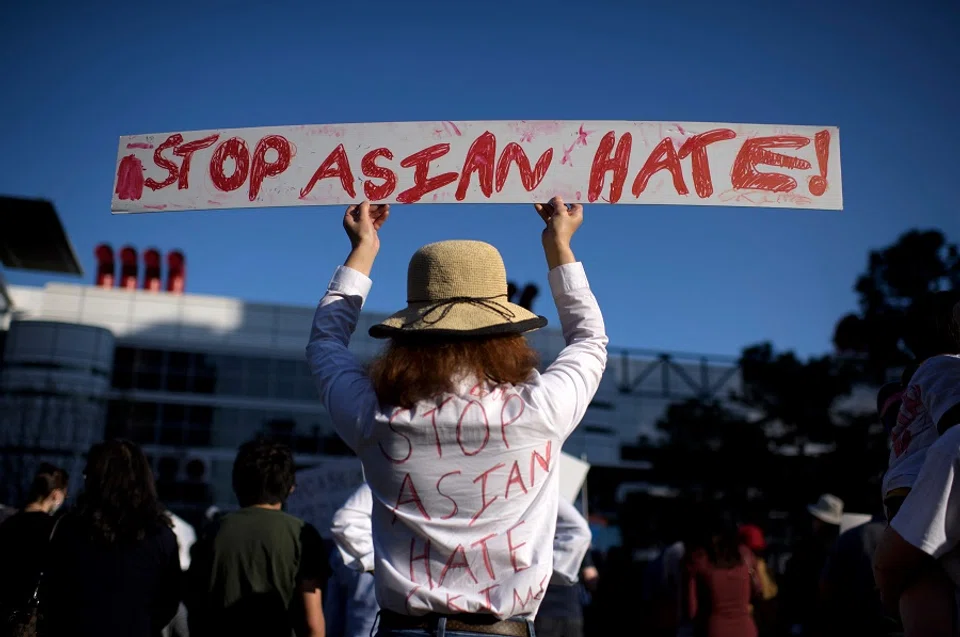Anti-Asian hate crimes: Chinese Americans' weak and disparate voice in US society
Associate Professor Wu Guo analyses reactions from the Chinese American community to the recent spike in anti-Asian hate crime. He sees a clear distinction between those who see these acts as racially motivated, and those who feel that they should be taken as crimes against public safety and leave it to the police. Interestingly, the debates show that the Chinese themselves may hold certain prejudices against other ethnic groups in the US. Amid the increasing complexity of ethnic relations in the US, what steps can the Asian community take to protect their rights?

Recently, there has been a rise in anti-Asian hate crimes in the US. A "Slap an Asian Challenge" on social media has even led to the targeting of the Asian elderly and Asian women. Based on a study by the Center for the Study of Hate and Extremism, while there has been a 7% decrease overall in hate crimes in the US from 2019 to 2020, those targeting Asians increased by 149%. 3,795 anti-Asian hate incidents were also received by the Stop AAPI (Asian Americans and Pacific Islanders) Hate Reporting Center between 19 March 2020 and 28 February 2021. Over 1,000 of those cases were reported in the very short period this year.
The insane personal attacks on Asians in the US and Canada have sparked off rare and protracted protests, safety concerns, and food for thought on the US system. At the same time, many Asians have begun reflecting on their image and status, and there has been some cognitive dissonance as well.
Asian Americans do not have a common identity or collective goal, and do not exert much influence in the spheres of politics, media, or public opinion.
Asian Americans not sitting back any longer
Overall, Asian residents in North America have imbibed positive values from their motherland such as forbearance, self-discipline, and an emphasis on family responsibility and education. Generally speaking, they have been able to improve their social class and status within the span of two generations through higher education. Even if some first-generation immigrants face language and even psychological barriers when settling in the US, they usually do not cause disturbance or harm to society.
However, the Asian population in the US is relatively small. In 2018, there were 22.6 million Asians in the US (out of which 5.2 million were Chinese Americans), which accounted for less than 10% of the American population. Asian Americans do not have a common identity or collective goal, and do not exert much influence in the spheres of politics, media, or public opinion. They are often seen as a silent and invisible group as they do not like to attract attention or make trouble. These traits hurt their chances of survival, though the recent protests have helped to change impressions of Asians to some extent.
In my view, the protracted street protests have the positive impact of drawing attention to the plight of Asians in American society, as well as on affecting future judicial proceedings to a certain extent.

The long-held impression of Asians as a "model minority" is being reexamined by the white American mainstream amid this upsurge in protests. Whether the original label was given in true praise or mockery, it should not become an invisible shackle on the Chinese-dominant Asian community, letting them swallow insults and remain silent. In my view, the protracted street protests have the positive impact of drawing attention to the plight of Asians in American society, as well as on affecting future judicial proceedings to a certain extent.
Just as past cases have demonstrated, sustained social protests have the power to turn incidents that might otherwise have been cast aside into ones that require prompt handling. The victims would get a fairer judicial verdict for the crimes committed against them, and the perpetrators who violated ethnic minorities' right to life and personal safety would receive harsher punishments too.
Standing up against Asian hate or racialising crime?
However, on Chinese websites in the US and WeChat group chats, views seem to differ in the Chinese community on the nature of anti-Asian hate crimes. Most people think that the hate crimes are racially motivated, while others insist that these are just crimes against public safety. Based on the earlier group's thinking, American society needs to reflect on itself and face up to its anti-Asian record, which is in line with the widely used slogan "Stop Asian Hate" and its related appeals. Based on the logic of the second group, however, Asians coming forward and speaking up as victims only serves to racialise crimes against public safety, and by extension worsen race relations; the right way to handle the situation is to treat the cases as crimes against public safety and get the police to step up their countermeasures and solve the problem through law and order.

The sheer number (nearly 4,000) of incident reports on attacks against Asians makes it hard to say that these are merely "crimes against public safety" and not intentional assaults against a specific ethnic group. The "Slap an Asian Challenge" on social media already clearly shows a racial bias. In addition, the large number of random or unprovoked attacks against the Asian elderly recently is clearly a phenomenon that cannot be eradicated by the police alone. Think about this: if random attacks are to be stopped as and when they occur, how many police officers would we need to patrol the roads and be stationed on trains? This is clearly impractical.
To tackle the issue, the Chinese, especially the elderly, have to increase their safety awareness and try not to go out alone. In fact, some Chinese communities have begun to patrol the streets to protect themselves. Aside from that, exerting pressure on American society and judicial institutions through street demonstrations; giving comfort, support, and financial compensation to the victims through the collective effort of the Asian community; and ensuring that the offenders are duly punished for their crimes are possible ways of dealing with the situation. However, one cannot deny that the motive of these hate crimes is racially driven.
Even worse, when the assailant turns out to be white, some defend them, not only showing no sympathy to the Asian victims, but interpreting their violent behaviour as "human nature" or stemming from a "fear" that the whites have.
Chinese apologists for racial crime
There are also some Chinese who are paying too much attention to the ethnicity of the perpetrators, and debating whether they are "whites" or "blacks". These disputes have further divided the Chinese community. It is disappointing to me that some Chinese social science academics who came to the US for further studies in the 1980s and who have spent decades living and teaching social sciences in the US are among those participating in these pointless arguments. Some of them insist on using statistics to prove that black Americans are a larger menace to the Asian community than white Americans. Even worse, when the assailant turns out to be white, some defend them, not only showing no sympathy to the Asian victims, but interpreting their violent behaviour as "human nature" or stemming from a "fear" that the whites have.

I think that such arguments and trains of thought reflect the deep-rooted racial bias and completely incorrect moral stands of some of these "elite" Chinese academics. On a cognitive level, these positions do nothing to help Chinese Americans understand the root problem accurately. Instead, such views only lead to completely unnecessary fragmentation and chaos within the Chinese community.
As the culprits of these attacks against Asians are both black and white Americans, I think that the Chinese need not engage in meaningless comparisons of the two groups and debate about which ethnic group is "better". They should instead consider all similar incidents as violations against Asians and understand that these are essentially a kind of "injustice", as termed by Martin Luther King.
Based on the premise of a common Asian identity, the direction of social action and thinking in society should help spur American society to reflect on the unfair bullying and violence that Asians have suffered, and urge American society and its institutions to recognise that the victims of racial oppression are not only African Americans - who are more visible and more vocal about these oppressions - but also include the more restrained Asians who have been labelled a model minority.
... when facing the two major populations of whites and blacks - the two ethnic groups that are both demographically and politically dominant - Asians should first recognise the racial characteristics of the issue and then appeal for justice, fairness, and rights in a straightforward manner.

A petition involving professors of universities across America that I participated in urged American universities to face up to the plight of Asians, increase campus diversity, and educate the school's administrative departments and students about Asians. It also served to remind American universities that racial issues cannot simply be characterised as "whites versus blacks".
I do not completely agree with the slogan "Stop Asian Hate"; it seems to be asking the other party to stop hating Asians, which is too much of a victimised stance or using the distinction between love and hate to win the moral high ground. Based on my twenty years of experience in and observations of the US, when facing the two major populations of whites and blacks - the two ethnic groups that are both demographically and politically dominant - Asians should first recognise the racial characteristics of the issue and then appeal for justice, fairness, and rights in a straightforward manner. There is no need to resort to the abstract and overly profound concept of love at all.
Related: Why do Chinese and Indian Americans stay silent during the US anti-racism protests? | Is America falling apart? | China and America: The power of historical memory | [Photo story] China-US relations in the late 19th century: Is history repeating itself? | [Photo story] When Chinese are not welcome



![[Photos] Fact versus fiction: The portrayal of WWII anti-Japanese martyrs in Taiwan](https://cassette.sphdigital.com.sg/image/thinkchina/3494f8bd481870f7c65b881fd21a3fd733f573f23232376e39c532a2c7593cbc)

